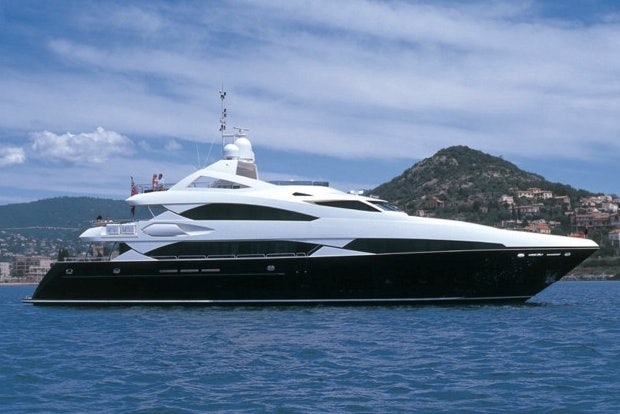Sunseeker Deal Highlights Advantages On Both Sides#

One of Sunseeker's iconic superyachts.
Last Friday, Chinese conglomerate Dalian Wanda made headlines for purchasing famed British yachtmaker Sunseeker, a brand that rivals the likes of Aston Martin for its James Bond film placement notoriety. As Chinese acquisitions of foreign companies have gone more high-profile in recent years, they have sparked an ongoing discussion about what these developments mean for both Chinese and international businesses. When it comes to Chinese acquisitions of foreign luxury brands in particular, both the Chinese companies making the purchase and the foreign brands being sold hope to seek key benefits from these arrangements.
The Chinese conglomerate’s announcement not only included Sunseeker, for which it will reportedly pay roughly $460 million, but also investment in a London luxury hotel, further underscoring its ongoing foreign luxury push. This idea may have been in the works for awhile, as in 2010, Dalian Wanda owner and founder Wang Jianlin bought a Sunseeker Predator 108 Special Edition, which at the time was China’s largest ever imported yacht.
Dalian Wanda Group Corporation Ltd. is one of many Chinese companies that have been on a foreign company buying spree since around the time of the 2008 financial crisis. The conglomerate, which focuses on real estate, tourism, hotels, and entertainment, made news last year with its acquisition of America's second-largest theater chain, AMC Entertainment Holdings, which some have speculated was part of a strategy intended to give China more leverage in the U.S. film industry. A longtime luxury developer in China, the company's foreign high-end developments have also included property purchased in New York for luxury hotel development and reported plans to expand its high-end mall business abroad to Mumbai, Turkey, and Washington.

Club Med's ski resort at Yabuli.
The company is not the only Chinese firm to acquire luxury yacht or hotel companies in recent years. Additional examples of Chinese acquisitions of foreign yacht brands include the Wantong Group's acquisition of Della Pieta in 2009 and Shandong Heavy Industry's purchase of Ferretti in 2011. Luxury hotels and resorts have also been of interest to Chinese companies, most notably with the recent move by Chinese-backed investors to take over France's Club Med for $719 million.
These luxury sectors are not alone in appealing to Chinese businesses, which are investing in the international luxury industry more broadly on everything from apparel to European, U.S., and Australian wineries. For apparel, fashion label Gieves & Hawkes was recently acquired by Trinity, as were several other European labels, and Hong Kong-based YGM has acquired Aquascutum, J.Lindeberg, Charles Jourdan, and Ashworth.
Chinese companies have also been acquiring and eyeing distressed vineyards in France, Chile, the United States, and Australia. During the first weekend of June, three prestigious Bordeaux wine châteaus, Bon Pasteur, Rolland-Mallet, and Bertineau St.-Vincent, were acquired by Hong Kong's Goldin Group, despite current tension between the European Union and China over wine imports from Europe. Chinese winery acquisitions, which are expected to value around $20 million over the next two years, have become so popular that Christie's recently opened Vineyards by Christie's in China, an estate agency which serves as "a discrete consultative service for clients looking to acquire vineyards in the world’s most sought-after wine regions.”
These luxury procurements coincide with the recent increase in Chinese takeovers of foreign companies that has been going on since 2007. According to the Wall Street Journal, prior to this time period, Chinese foreign investments mainly consisted of foreign debt, but have more recently begun to pivot toward companies, especially after prices of acquisition dropped due to the 2008 financial crisis. China's foreign acquisitions have been predicted to quadruple by 2020. This turn has been attributed by some to China's global trade surplus as well as a shift away from investing in U.S. government debt in order to strengthen the Renminbi's role as a potential international reserve.
Acquisition of foreign luxury companies brings several benefits to Chinese buyers, including a company’s already-established brand heritage, research and development tools, and management structure. Chinese luxury brands frequently struggle to gain prestige on a level that allows them to compete with international luxury heavyweights in the Chinese market, so purchasing a foreign company comes with an automatic brand history that will appeal to Chinese consumers. Additionally, research and development opportunities come built-in with foreign brands. “There has been a big increase of costs in China, and so without a brand or technology, it’s increasingly hard [for Chinese companies] to make a reasonable margin,” says André Loesekrug-Pietri, A Capital’s chairman and managing partner in a recent Time article about the subject. The established management structures are also often kept in place with foreign acquisitions. For example, Dalian Wanda kept AMC's entire management structure when bought the company, and reportedly plans to do the same with Sunseeker.
Chinese acquisitions of foreign companies, especially in the United States, have met with their fair share of criticism based on grounds of national security and product safety. The recent Shuanghai acquisition of U.S. pork company Smithfield was condemned by some U.S. policymakers such as Chuck Grassley on grounds that the acquisition might be harmful to food safety. Acquisitions of international luxury companies, while not as connected to these issues, have not been immune to heavy rhetoric. "Chinese predators step up luxury push," read the headline of one recent Financial Times article on the Sunseeker deal.
However, foreign companies with the China market in mind are set to benefit from Chinese buyouts as well. Club Med has been pushing to expand beyond its European tourist base to attract travelers from the world’s number one source of tourism, taking measures such as building two new resorts in China and upgrading its Asia resorts. The Chinese bid, if successful, would give the company easier legal inroads to expansion in China as well as more opportunities to strengthen marketing efforts toward potential Chinese customers.
With the combination of Chinese companies' demand for brand prestige as well as the continued importance of the Chinese market to foreign brands, Chinese acquisitions of luxury companies are likely to become more frequent and high-profile, with iconic names in high demand for the foreseeable future.